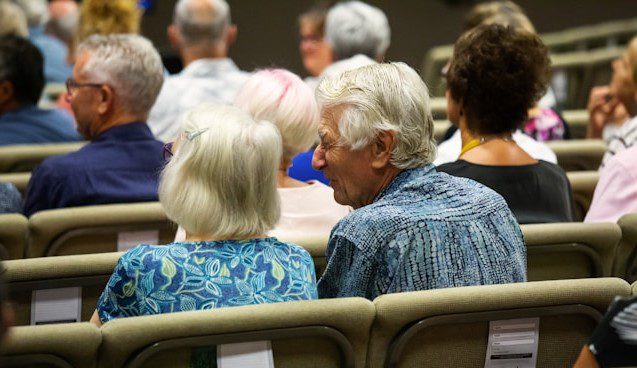Age-friendly Events? Need for Hearing Accessible Venues for Seniors

As their numbers grow, senior citizens attract all sorts of attention. “Age-friendly” has become a mainstream expression. It reflects sensitivity and inclusion. It is meant to encourage older people to sign up for and participate in sessions that are designed for them. But, are their needs being met, starting with communication access? According to statistics, “Age is the strongest predictor of hearing loss among adults ages 20-69, with the greatest amount of hearing loss in the 60-69 age group.” Although the communication disorder called “Hearing Loss can affect anyone , it tends to get worse as people age.
And so, community centers, libraries and churches list presentations on topics ranging from health issues, legal rights, settling estates and pre-registering for funeral services to entertainment and social activities. All of these are seriously worthwhile efforts and ideas. Yet, it would be great if the sponsors took time to understand the importance of hearing & communication support, especially in an ageing population. Without assistive listening and hearing help in noisy places, there is little chance for effective senior learning and participating. Well-meant opportunities turn out to be inaccessible for in-person meetings.
Background noise is the enemy
How accessible are our local libraries? I attended a presentation on Home & Hospice Care at a library near me. There was not even a Public Address (PA) system in the room. When I inquired about this, I was told that it was a “small” 20-person room, and they never had issues before. The “small” room became very crowded and noisy very fast. Extra chairs were brought in. Pretty soon there was a standing-room-only. People began talking, trying to find out from their neighbor what was being said. Some left. Why hang out in such a distracting and confusing din?
When I was giving a presentation at yet another library, I asked for at least a portable PA unit. This was done, and it turned out to be very helpful. The convention-style microphone did a good job focusing the speech signal. People gave some enthusiastic thumbs-up signs – especially in the back of the room – and I did not have to yell. It actually does not have to be that loud to be more hearable and understandable.
Last year, a representative for a regional day-event geared at seniors told me that people with hearing loss have hearing aids or sit closer to the stage. No problem! I don’t believe that they understood the notion of assistive listening technology in their target audience. There was an ASL interpreter. But those who are hard-of-hearing know little if any ASL. Obviously, I did not attend as there was no hybrid or online option.
Hearing Aids can’t do it all
Announcements for events meant for seniors should always state what type of assistive listening technology is provided. Access to communication is essential for learning at any age. Relying on people having hearing aids or fending for themselves is not acceptable. Hearing aids are so much better nowadays than they used to be. However, they still struggle sorting out speech in background noise. This is why assistive technology is needed to focus and raise the speech signal above background buzz.
Asking is Advocating
As a longtime resident in the World of Hearing Loss, I have learned not to take things for granted. Though hearing loss is a communication disability in need of accommodation in public places, those with hearing loss may find that their needs are not met – or not in a satisfactory way.
And so, let’s not be shy! Before signing up, organizing rides or buying tickets to an event, ask ahead of time what type of hearing accommodation is in place, especially if no Access information is provided in the brochure. One gets prepared, which may help avoid disappointment and even anger. Maybe some self-accommodation is possible? However, asking about communication access is also a way of telling organizers and sponsors that “age-friendly” senior events do call for hearing accommodation. In this case, asking becomes a way of advocating!